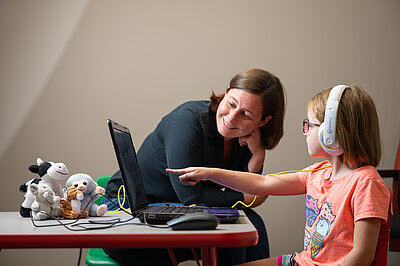NDSU psychology professor studies how children learn homophones

Erin Conwell, North Dakota State University associate professor of psychology, has received a $434,929 grant from the National Institute of Child Health and Human Development (NICHD) to fund her research project entitled, “Context and multiple meanings: Homophone learning in early childhood."
Conwell is conducting a three-year study focused on how children aged four to six years learn homophones, or words that sound the same, but have different meanings, such as "new" and "knew" or "flower" and "flour." Through controlled experimental studies, her research aims to understand how children learn that words can have more than one meaning, which words have more than one meaning, and how to tell which meaning of a specific homophone a person uses.
Conwell is utilizing a cross-situational word learning approach, in which children are introduced to new words for unfamiliar objects amidst situations where it's unclear which word corresponds to a specific object. After repeated exposures, participants begin to unravel the connections between words and their meanings.
Previous research by Conwell indicates the significant challenge children and adults face in grasping multiple meanings for words within such studies. Conwell’s plan is to systematically change different properties of the contexts and meanings of the words to see what kinds of information might improve the learning of homophones in ambiguous situations.
“These results will improve our understanding of how word learning proceeds in typically developing children and may be useful for supporting literacy acquisition,” said Conwell.
NDSU Vice President of Research and Creative Activity Colleen Fitzgerald added that Conwell's research shows the value of life sciences, one of NDSU's strategic research priority areas. "This project has the potential to build upon NDSU's history of cognitive sciences research by increasing our knowledge of how we learn and acquire language, which will benefit children in North Dakota and beyond. In addition, Dr. Conwell is a proponent of introducing students to research, so her project will provide research opportunities for undergraduate students."
Conwell adds that her grant is not just about research but also about bringing together students and the local community. She plans to include undergraduate students in the research, which will provide them valuable experience. Conwell also plans to work closely with families and childcare centers in Fargo-Moorhead, sharing her findings and learning from them too.
NICHD was established in 1962 to study human development across all life stages, particularly focusing on disabilities and important events that occur during pregnancy. NICHD's mission is to lead research and training aimed at comprehending human development, enhancing reproductive health, bettering the lives of children and teenagers, and maximizing abilities for all individuals.
For more information, see NICHD project 1R15HD115135-01: Context and multiple meanings: Homophone learning in early childhood.


